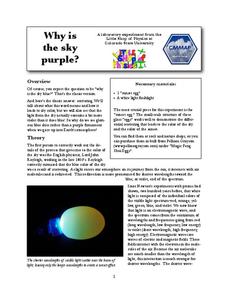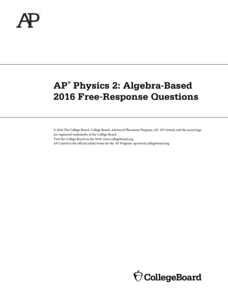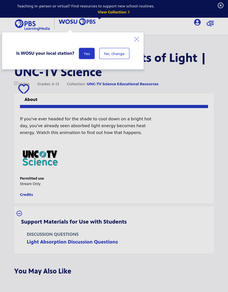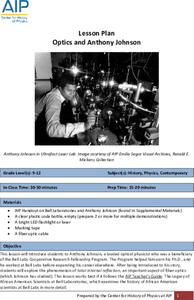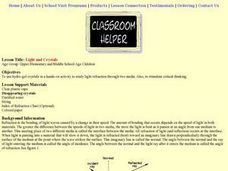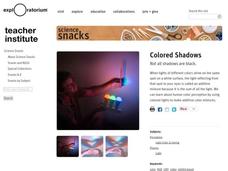Virginia Department of Education
Light and the Electromagnetic Spectrum
Lead your class in a fun-filled team activity that encourages collaboration while learning important concepts. Pupils actively participate in a discussion on the experimental design and the role of mirrors. They perform group activities...
Colorado State University
Why Is the Sky Purple?
The color of the sky depends on the time of day. Young scholars experiment with scattering different wavelengths of light to recreate the color of the sky. They observe both the longer blue wavelengths and the shorter red and orange...
101 Questions
Pool Bounce
Use geometry to improve your pool game! Learners analyze the front half of a pool shot to determine its resulting path. By measuring the angle of incidence, they are able to predict the path of the ball.
Illustrative Mathematics
Bank Shot
Young geometers become pool sharks in this analysis of the angles and lengths of a trick shot. By using angles of incidence and reflection to develop similar triangles, learners plan the exact placement of balls to make the shot....
Bowels Physics
Waves and Sound
Explore how sound travels as waves with a straightforward lesson that explains the basics of waves in relation to sound. The presentation considers sound waves in both open and closed pipes and shows how to calculate wavelength and...
PHET
Geometric Optics
What would happen if your entire world was flipped upside down? In addition to changing the distance and size of an object, lenses flip the image upside down. The simulation allows scholars to vary the object, move the object, move the...
College Board
2016 AP® Physics 2: Algebra-Based Free-Response Questions
While AP Physics 1 counts as an introductory college Physics course, AP Physics 2 counts as a second-year college Physics course. Help scholars prepare for this more advanced college-level test with questions from previous assessments...
PBS
Light Absorption: Effects of Light | UNC-TV Science
Beat the summer heat by exploring the properties of color. Scientists view a video explaining the relationship between light absorption and energy transfer using variables including intensity, time, and wavelength. A multiple-choice...
American Institute of Physics
Optics and Anthony Johnson
Message sending has come a long way since the days of Morse code's dots and dashes. Young scientists study the research of optical physicist Anthony Johnson and his work in fiber optics, lasers, and the principle of total internal...
Curated OER
Light and Vision
Students explore how light affects vision. In this light instructional activity, students construct a shoe box model to represent an eye. Experiments are performed with various light sources. Students draw conclusions about how the eye...
Curated OER
THE MANY COLORS OF SUNLIGHT
Students examine rainbow components, spectral colors, colors perceived by the eye, hot solids, glowing rarefied gas, absorption, that light is a wave, and optics.
Curated OER
Frozen Film
Young scholars are introduced to the topic of light interference through this hands-on activity. They observe how light reflects off two surfaces and then meets to form an interesting variation of color on a film surface.
Curated OER
The Energy of Light
Students discuss different ways engineers use light. In this engineering instructional activity, students are introduced to the properties of light and the way light is used. They view a demonstration of light waves using a slinky, and...
Curated OER
Capturing Light: The Science of Photography
Students explore light, and how it travels in straight path, recognize that light-sensitive chemical processes can be used to create images using light as catalyst, discover that light can be refracted by convex lens to focus camera,...
Curated OER
The Space Cadet's Laboratory: Using Electromagnetic Energy to Study Astronomy
Young scholars build their own spectrophotometer to study light. In this physics lesson, students explain the dual nature of light. They calculate the angle of incidence and refraction using Snell's law equation.
Curated OER
Snell's Law
Students determine whether the index of refraction of sample of Corn Syrup meets Federal standards. This task assess students' abilities to explain the procedures for investigation, plan for recording and organizing observations and...
Curated OER
Gel-O-Colors!!
What distinguishes the differences between refraction and reflection? Learners identify the properties of light as they mix colored light to create new color variations. As they work they gather data about the properties of light and...
Curated OER
Microscopes, Telescopes, and Cameras
In this lenses worksheet, students will explain how microscopes work by completing 4 short answer questions. Students will compare refracting telescopes with reflecting telescopes by writing the terms given under the correct column. Then...
Curated OER
Make a Telescope!
Students study modern astronomy and technology. In this telescope lesson students design and build a refracting telescope then redesign for better performance.
Mr. E. Science
Characteristics of Waves
Waves, waves, and more waves. Here, class members look at the many types and characteristics of energy waves including transverse, longitudinal, standing, seismic, p-waves, s-waves, and l-waves.
Curated OER
Light and Crystals
Students complete hands-on activities to observe light refraction. They observe and compare the refraction in different substances and then write about it.
Curated OER
Waves, Sound, and Light
Ninth graders explain waves in terms of energy transfer and describe their basic types and characteristics. They solve mathematical problems involving wavelength and frequency. Students conduct experiments in reflection and refraction.
Curated OER
Colored Shadows
Students examine how humans perceive color. In this refracted light lesson, students explore the different ways color is seen by the human eye. Students will use colored lights and colored paper and solid objects to make additive color...
Curated OER
What's Up?
Learners compare and contrast the various heavenly bodies found in the sky at night. They identify the moon and stars in the sky as well as how the stars form pictures called constellations. Students also experiment with reflection and...
Other popular searches
- Light Refraction
- Reflection and Refraction
- Light Reflection Refraction
- Refraction of Light
- Index of Refraction
- Reflection Refraction
- Science Light Refraction
- Absolute Index of Refraction
- Wave Reflection Refraction
- Diffraction and Refraction
- Light Refraction Water
- Angle of Refraction

